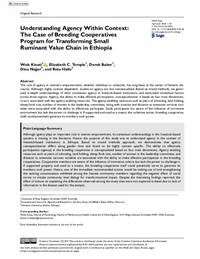Understanding Agency Within Context: The Case of Breeding Cooperatives Program for Transforming Small Ruminant Value Chain in Ethiopia

Authors:
The role of agency in women’s empowerment, whether individual or collective, has long been at the center of feminist discourse. Although, highly context dependent, studies on agency are less contextualized. Based on mixed methods, we generated in-depth understandings of what constitutes agency in livestock-based institutions, and associated contextual factors across three regions. Agency, the ability to make effective participation, conceptualization is based on four main dimensions, in turn associated with key agency enabling resources. The agency-enabling resources such as years of schooling, land holding, sheep flock size, number of women in the leadership committee, along with location and distance to extension services variables were associated with the ability to effectively participate. Study participants are aware of the influence of normative environment but lack the power to challenge it. If supported and used as a means, the collective action, breeding cooperative, itself could potentially generate its members such power.
